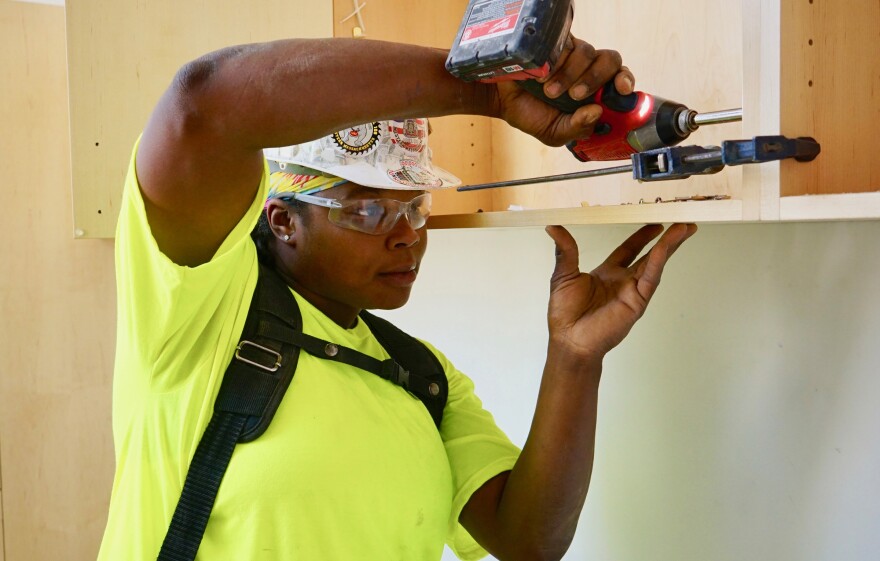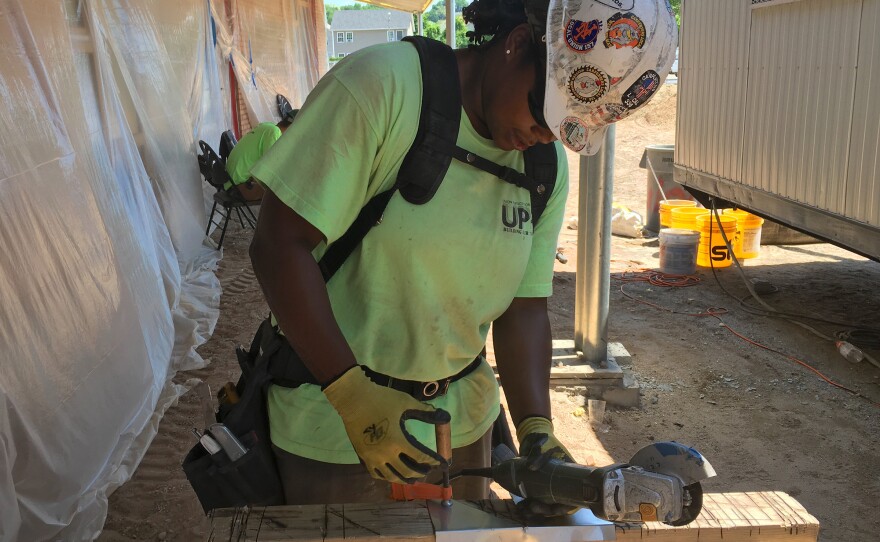Seven years ago, getting into carpentry wasn’t even on Tyeka Robinson’s radar. She was a single mom struggling to make ends meet.
“I was working these odd and end jobs and not enough money to pay the bills,” she said. “I didn’t have a clue how to join the trades.”
It was a chance encounter with a union carpenter that sparked Robinson to look into the building trades.
“It was my best friend’s birthday and we went on a party bus,” she said. “And on that bus was another carpenter. And he just started talking and telling me, ‘You look like you could do the job.’”
The carpenter also told Robinson about the perks.
“The annuity, the pension, the pay,” she said. “And the next day, I woke up and I went straight to the address he told me to go to. Six months later, I got a letter saying I was accepted into the apprenticeship, and that’s when my life changed.”
Now Robinson is a carpenter working on the nearly billion-dollar MGM casino project in Springfield.
“I love creating new things, thinking outside the box and seeing what I’ve done from nothing become something,” she said. “That’s an awesome feeling.”
Robinson is part of the estimated seven percent of building trades workers in Massachusetts unions who are women, according to the Policy Group on Tradeswomen’s Issues.



Now a statewide initiative wants to increase that number to 20 percent. The campaign is called Build a Life That Works. It’s a partnership among tradeswomen advocacy groups, building trade unions, construction industry leaders and the Massachusetts Gaming Commission -- which is keeping tabs on construction of the casino projects in Springfield and Everett.
“It’s really been an issue of changing perceptions both within the industry and in the broader public,” said Lisa Clauson, an organizer for the New England Regional Council of Carpenters. “Because the trades have traditionally been an industry that has mostly white men doing it, women and people of color have not viewed it as a place where they can go and find opportunity. And so, when you drive by construction sites and you don’t see anyone who looks like you, you don’t think it’s a place that you can stop and inquire about work.”
Clauson said the union wants to be more representative of the communities it works in.
“A lot of our members are going to be nearing the ages of retirement soon,” Clauson said. “So then it’s really about making sure that people who have not been traditionally in it are finding out about those opportunities, and are coming in.”
The union is getting the word out through a targeted media campaign, including highway billboards and a website showcasing women’s personal experiences in the trades. They’re also helping women apply for union apprenticeship programs.
At monthly information sessions in Boston and Springfield, tradeswomen help make the pitch to new recruits by touting the benefits, including paid apprenticeships and union pensions.
“I make $27 an hour as a third-year apprentice, and then my benefit package is $25 an hour,” said Amy Calandrella, an operating engineer, during a recent session in Springfield.
The sessions also address the challenges of construction work -- especially ones that women are more likely to have to deal with, including child care.
“Mothers with young children, you have to be creative to figure out how to get child care for the non-traditional hours, because construction work days start very early,” said Kate Harrison, a program coordinator with the campaign.
Springfield resident Kayla Santiago attended a recent information session because she wants to change careers.
“Right now, I’m at an office job and I’m a phone operator, but I’m totally looking to get out of that,” Santiago said. “This is my passion. I love doing things hands-on, so I’m ready. I’m excited.”
Stephanie Stone-Crivelli is applying to apprentice with the elevator constructors union. She came to the Springfield information session to meet and hear from other tradeswomen.
“Because you know that you’re not the only one,” she said. “They know the ropes. They’re experienced. They can guide you in the direction you need to go. It’s so important to have other women in the trades encouraging other women to come into the trades.”
Robinson said she wishes she would have had that kind of encouragement when she was first starting out as a carpenter.

“As a woman coming on the site, you have to give 200 percent,” Robinson said, “And then you still get these guys that want to talk behind your back and say, ‘Oh, why is she here?’ I got to deal with double, being black and being a woman.”
Robinson said there were times when she’d go to the portable toilet on a job site, and cry.
“And I just looked at my check, and I thought about my son, and I said, ‘You gotta suck it up,’” she said. “And I’d come out of the Porta-John, wipe my tears, and keep working.”
Clauson said other women have had similar treatment in the industry.
“There certainly is sexism that exists in the industry that is not opening doors and creating opportunitIes for women coming into this work,” she said. “They have had a harder time getting hired, and having men in the industry take them seriously, and feel that they could do the work.”
That’s why Clauson said recruitment is just one side of the push.
The other is getting the industry to commit to hire more women on large-scale construction projects. The Massachusetts Gaming Commission put diversity requirements on the Springfield and Everett casino projects.
“It gets that foot in the door, for that woman to then be able to showcase her skills,” Clauson said. “What we’re finding is that some contractors, unfortunately, are only hiring diversity when they are required to. But many are starting to realize that this person is a good worker, and let me take them on to my next job, even though it doesn’t have a requirement on it.”
MGM has exceeded a mandate that at least 6.9 percent of its construction work be completed by women. It’s at nearly nine percent.
That’s changed how Robinson feels at work.
“That’s the first job site I’ve ever been on that I’ve seen so many different women in trades,” she said. “It’s a great feeling. And say, if one of them are going through something, we’re on the same job site, so we can pull each other aside and be like, ‘Listen, don’t worry about that, girl. Just take some deep breaths, you’re going to be OK.’ So we got each other’s back. I just hope that it doesn’t change.”
There are signs that the momentum will continue. Colleges in the region, including private ones, have also been stepping up their commitments to hire more women on campus construction projects.
And Robinson is doing her part to spread the word that the trades need more women.
“If you like working with your hands and you like to get dirty,” she said, “come on down.”











